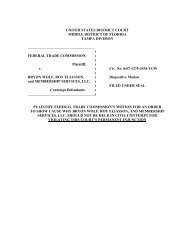HELO RCPT TO QUIT MAIL FROM DATA - Federal Trade Commission
HELO RCPT TO QUIT MAIL FROM DATA - Federal Trade Commission
HELO RCPT TO QUIT MAIL FROM DATA - Federal Trade Commission
Create successful ePaper yourself
Turn your PDF publications into a flip-book with our unique Google optimized e-Paper software.
Concurring Statement of <strong>Commission</strong>er Pamela Jones Harbour<br />
Concurring Statement of <strong>Commission</strong>er Pamela Jones Harbour<br />
In Re: CAN SPAM Subject Line Labeling Report<br />
I concur in the release of the <strong>Commission</strong>’s report to Congress concerning subject line<br />
labeling, submitted pursuant to Section 11(2) of the Controlling the Assault of Non-Solicited<br />
Pornography and Marketing Act of 2003 (the “CAN-SPAM Act”), 15 U.S.C. § 7710(2) (2003)<br />
(the “Report”). I write separately to highlight the potential usefulness of “ADV labeling” to<br />
assist consumers in managing unsolicited commercial email (“UCE”).<br />
I agree with <strong>Commission</strong>er Leibowitz’s separate statement that “an ADV labeling<br />
requirement could be a modest tool to empower consumers to filter and sort commercial emails<br />
– to read them later, evaluate them individually, or delete them in bulk if they choose.” I also<br />
agree that Congress asked the <strong>Commission</strong> to study an ADV labeling requirement precisely<br />
because Congress wanted consumers to have the option not to receive or to sort UCE – even<br />
emails sent from legitimate marketers.<br />
I, like <strong>Commission</strong>er Leibowitz, would have preferred that the Report further emphasize<br />
the importance of providing adequate tools to enable consumers, who so wish, to filter UCE,<br />
even from legitimate marketers. One consumer’s public comment stated: “Treat my email as<br />
if it were an extension of my phone, as it is, and do not call me if unsolicited.” (Gilliland, Mark<br />
- Comment, 1). The desires of such consumers should be respected.<br />
The Report does, however, set forth a number of technological options that consumers<br />
can use to sort, delete, or block UCE. Examples include highly calibrated or customized<br />
filters; “white-lists” of particular desired senders; personalized Bayesian filtering; and blocking<br />
mechanisms that bar all email coming from sources outside of the consumer’s address book. If<br />
consumers choose to avoid receiving UCE from legitimate marketers, it appears that existing<br />
technological solutions will allow them to do so. While ADV labeling would provide consumers<br />
with an easy way to sort UCEs from legitimate marketers who would adhere to an ADV labeling<br />
requirement, it appears that consumers already have acceptable tools available to assist them.<br />
Accordingly, I have decided to concur in the <strong>Commission</strong>’s release of this Report.<br />
1

















